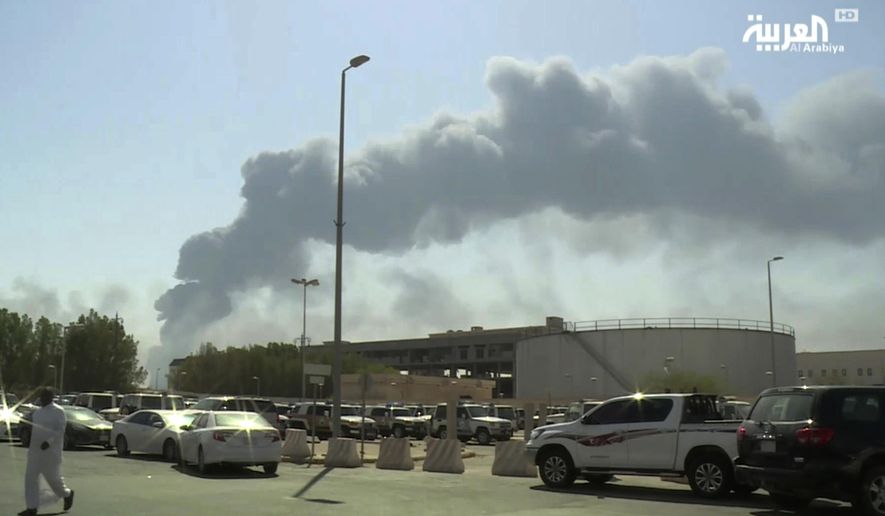NEW YORK — Saudi Foreign Minister Adel al-Jubeir said here Tuesday that the attack earlier this month on Saudi oil infrastructure was “an act of war” and that Riyadh is “certain” it was launched by Iran.
However, Mr. al-Jubeir, who spoke at an event on the sidelines of the annual U.N. General Assembly occurring in New York this week, downplayed the prospect that Saudi Arabia or the United States are on the verge of countering with military strikes against Iran.
“We want to make sure that we avoid war at all cost, but we are not going to sit there with our hands tied while the Iranians continue to attack us,” the Saudi foreign minister said in remarks at the Council on Foreign Relations think tank.
“We want to look at all of our options — at diplomatic options, at economic options and military options and then make a decision and move in a very deliberate and very effective manner,” he said.
Mr. Al-Jubeir’s comments came after President Trump blasted Iran’s “bloodlust” in a speech at U.N. headquarters on Tuesday morning. Mr. Trump vowed to expand U.S. economic sanctions against Iran in the wake of the attack on Saudi Arabia, which the administration views as a close American ally.
“As long as Iran’s menacing behavior continues, sanctions will not be lifted,” the president said.
Trump administration officials have previously joined with Saudi officials in blaming Iran outright for a spray of Sept. 14 drone attacks that damaged Saudi oil production capabilities and triggered a spike in global crude oil prices.
Iran-backed Houthi rebels operating from Yemen, which is situated to the south of Saudi Arabia, have claimed responsibility for the attack.
But Mr. Al-Jubeir said Tuesday that Saudi officials believe that Iran, which is situated to the north of Saudi Arabia, was “responsible for the attack because the equipment is Iranian equipment.”
“We know that it didn’t come from the south. We know it because of the range of the equipment,” he said. “We believe it came from the north. We are certain it came from the north and what we are doing now is investigating to locate the actual launch site.”
“We have asked the United Nations to send experts to Saudi Arabia. They are in the Kingdom now. Other countries have sent experts to Saudi Arabia. They are in the Kingdom now and once the…investigation is complete, we will make the announcement and we will pin the blame — but we believe that Iran is responsible because these were Iranian weapons.”
The attack has elevated already soaring tensions in the Middle East. But it also appears to have pushed European powers — critical of Mr. Trump’s withdrawal last year from the Obama-era 2015 Iranian nuclear deal — toward a potentially closer alignment with Washington and Riyadh against Iran.
The leaders of the United Kingdom, France and Germany signed a joint statement Monday declaring that they are in agreement with the U.S.-Saudi view that Iran was responsible for the attack on the Saudi oil facilities.
In his remarks Tuesday, Mr. Al-Jubeir described the European statement as “a very significant step forward in terms of the European position.”
The Saudi foreign minister’s comments came before he headed into a special meeting slated for Tuesday afternoon between several other Arab leaders and Secretary of State Mike Pompeo at the Palace Hotel in New York City.
Officials said the meeting of top diplomats from countries in the Gulf Cooperation Council — a regional security body that includes Saudi Arabia, Bahrain, Kuwait, Oman, the United Arab Emirates and Qatar — would be key to the Trump administration’s ongoing push to rally those nations into an alliance against Iran.
The effort has struggled to gain momentum over the past year due to infighting between GCC members, particularly Saudi Arabia and Qatar, which the Saudis accuse of being too close with Iran and of supporting jihadist terrorism elsewhere in the Middle East. The Qataris deny the allegations.
Iranian President Hassan Rouhani, meanwhile, is expected to counter the U.S.-led efforts in the Middle East when he delivers his own speech at U.N. headquarters on Wednesday. Several news reports have said Mr. Rouhani will calls for Mideast powers to fall in line behind an entirely separate regional security plan led by Iran.
• Guy Taylor can be reached at gtaylor@washingtontimes.com.




Please read our comment policy before commenting.